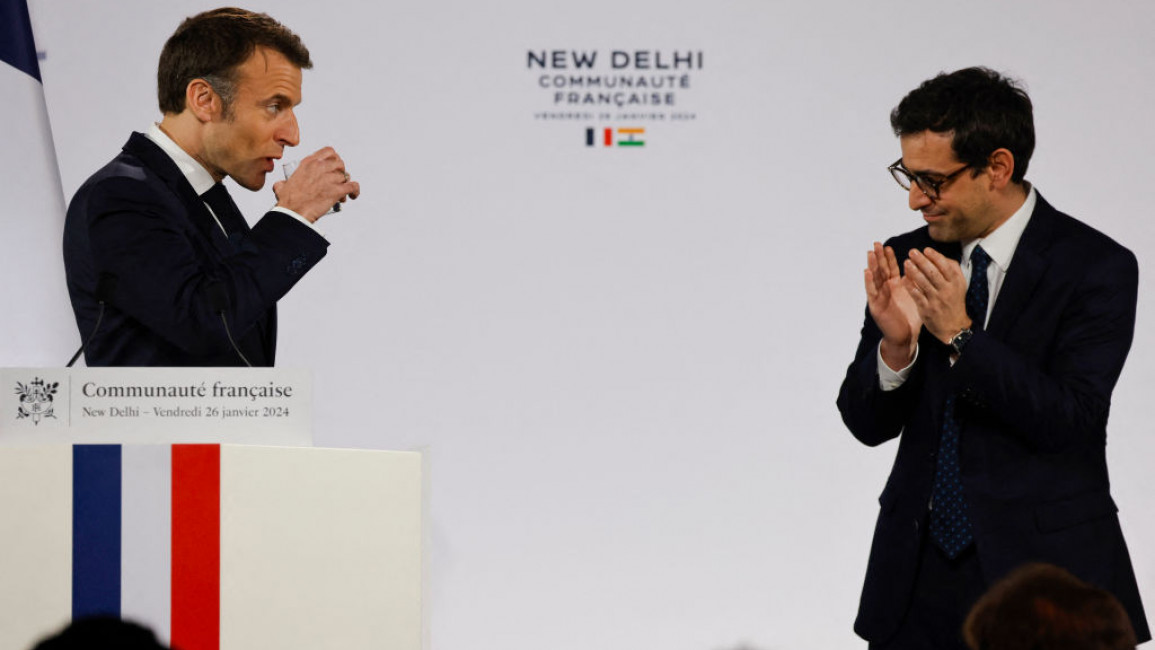Morocco: homophobia overshadows first visit of France's FM Stéphane Séjourné
After a series of diplomatic crises, France's foreign minister, Stéphane Séjourné, has finally visited Morocco, hoping to open a new chapter in the Paris-Rabat fractured relationship. However, Séjourné's sexuality has garnered significant attention in the North African kingdom, partly overshadowing the 'historical visit.'
On Monday, Séjourné is set to meet with his Moroccan counterpart, Nasser Bourita, over a "working lunch, in a significant step towards 'réchauffer' the relationship" between the once friendly states, according to a diplomatic source quoted by AFP.
"Séjourné had been personally tasked by President Emmanuel Macron to work towards reconciliation with Morocco," added the source.
Who is Stéphane Séjourné?
On 11 January, Stéphane Séjourné, an MEP and Secretary-General of the presidential party Renaissance, becomes the youngest Foreign Minister of the Fifth French Republic.
Séjourné, once a socialist, has been a loyal supporter of President Emmanuel Macron since late 2014. He is also a rumoured long-term partner of Prime Minister Gabriel Attal, dubbed a controversial "mini-Macron" and a potential candidate for the next presidential election.
Last month, he said that accusing Israel of genocide is to "cross a moral threshold." "We cannot exploit the notion of genocide for political ends." He did not comment on the skyrocketing death toll in the Gaza Strip. Israel has killed over 29,000 Palestinians in Gaza since 7 October last year.
Séjourné, being part of his rumoured partner's government, has stirred a wide controversy in Paris about nepotism in the French state.
However, the two officials have never publicly addressed the rumours. As part of a profile in Libération, Stéphane Séjourné had dodged the question. "He neither confirms nor denies anything," the newspaper wrote.
Nevertheless, in Morocco, the controversy is slightly different.
'Attal and Séjourné mark the downfall of France'
For Morocco's former PM, Abdellilah Benkirane, Attal and Séjourné's positions in the government signify the downfall of Paris' diplomacy. "I did not think things in France would escalate this quickly. How could he (Attal) be proud of that (being gay) and being married to his foreign minister," said the Islamist leader on Sunday, 25 February.
Facing a crowd of his 'brothers' in the Justice and Development Party (PJD), Benkirane lamented the "peak" of French politics under Jacques Chirac and François Mitterrand, asserting that the homosexuality of the new French officials weakened Paris's influence.
"You should be worried about what is coming for us," added Benkirane, warning of the "danger of homosexuality."
Several Moroccan users took to social media to decry the former PM's homophobic comments against the two French officials. Meanwhile, some took Benkirane's defence.
In 2019, a survey by BBC News Arabic and Arab Barometer research showed that only 21% of Moroccans accept the LGBTQ+ community.
Paris-Rabat tensions: Pegasus, visas and Western Sahara
In recent years, significant tensions have arisen between Morocco and France, former staunch allies in the region.
Although speculative, the first signs of coldness between Paris and Rabat started showing right after the Pegasus scandal in 2021 when the daily Le Monde revealed that the cell phones of Macron and fifteen members of the French government were likely among the targets of an unidentified Moroccan security service.
Since then, communication between President Macron and King Mohammed VI has reportedly stopped.
Paris' 'ambiguous' position on Western Sahara, a key diplomatic file for the Moroccan state, and its decision to halve the issuance of visas to Moroccans have fueled further Rabat anger.
With an energy crisis at home and losing ground on the African continent, Macron is trying to build bridges with Algeria, Rabat's arch enemy, without burning those established with Morocco.
So far, the French president's tightrope policy in the Maghreb has been terrible, and Séjourné's mission hopes to change that.
"There is a very clear desire from the minister (Séjourné) to personally invest in the Franco-Moroccan relationship, to set a new political agenda, to regain trust, and to revive this relationship, which is an old and friendly one, to put it back into motion in a positive dynamic," said the spokesperson for the Quai d'Orsay on 22 February in a press briefing.



